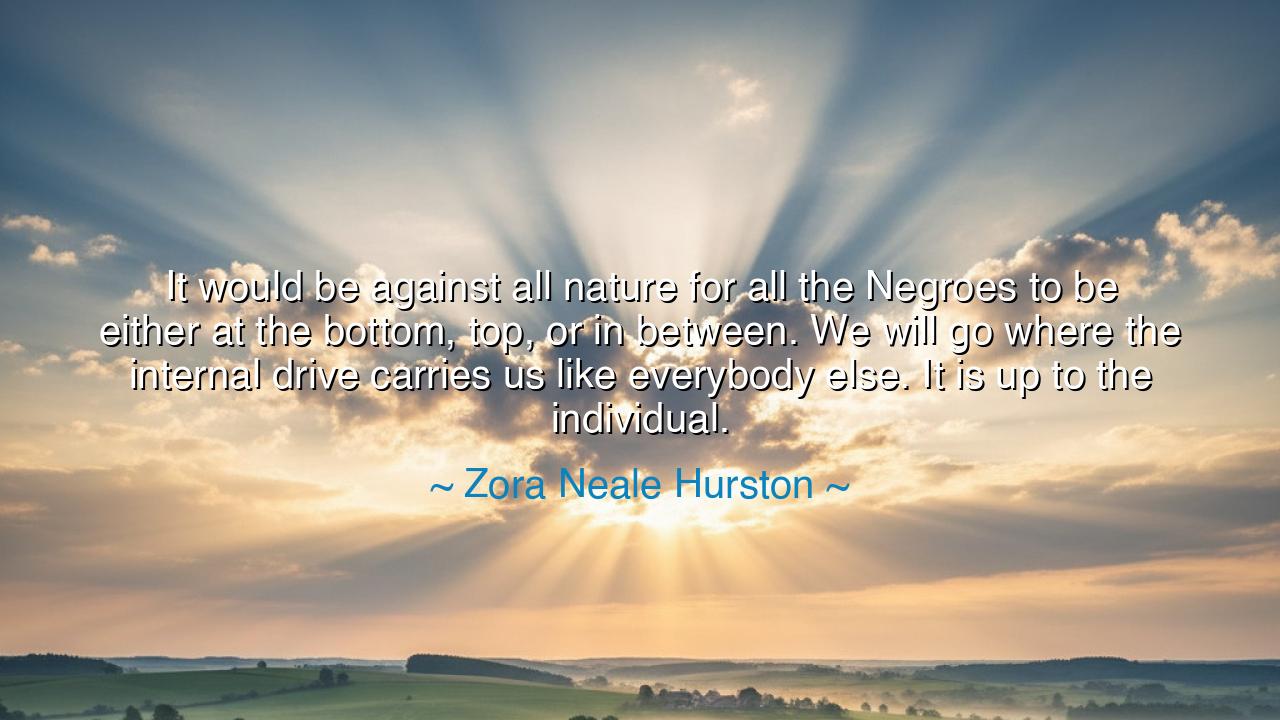
It would be against all nature for all the Negroes to be either
It would be against all nature for all the Negroes to be either at the bottom, top, or in between. We will go where the internal drive carries us like everybody else. It is up to the individual.






Zora Neale Hurston, daughter of the Harlem Renaissance and fierce defender of human dignity, once declared: “It would be against all nature for all the Negroes to be either at the bottom, top, or in between. We will go where the internal drive carries us like everybody else. It is up to the individual.” These words ring with the courage of a prophet, for she spoke not only to her own generation but to all who would listen: that destiny is not assigned by race or station, but by the fire of the spirit within.
To say it would be against all nature is to root her claim in eternal law. For nature knows no permanent hierarchies—seasons turn, rivers carve valleys, forests grow from barren soil. So too, people cannot be fixed into one place by decree of others. The wind of the internal drive moves each soul differently: one may rise, one may fall, one may remain, and this is not failure but the rhythm of life itself. Hurston lifts this truth above prejudice and declares it as cosmic order.
Her words also bear the mark of defiance. In her time, many sought to chain the Black man and woman not only in body but in destiny, declaring them forever bound to the bottom. Hurston rejects this lie with the authority of nature itself: such a fate is impossible, for the individual cannot be caged by the weight of stereotype. Each person, she insists, will go where their will, their labor, and their genius take them. In this she proclaimed a radical vision of freedom—that the measure of a man or woman is not collective destiny, but personal striving.
History offers us shining examples of this truth. Consider Frederick Douglass, born into slavery, denied literacy by law and violence, yet driven by an unquenchable internal drive. He taught himself to read in secret, and through knowledge, he rose to become an orator, writer, and adviser to presidents. His story is proof of Hurston’s words: it is up to the individual to harness the drive within, regardless of the chains imposed without. He did not remain at the bottom because nature had not destined him for it, and neither could society’s chains override his spirit.
Yet Hurston’s teaching is not only heroic but balanced. She reminds us that not all will rise to the top, and this too is natural. Among any people, there will be diversity of fate—leaders and laborers, artists and builders, dreamers and doers. This is not to shame, but to affirm: true justice lies in granting every soul the chance to follow its internal drive, unblocked by prejudice, unchained by false destiny. In such freedom, some may soar, some may rest, but all will live as they were meant to live.
The lesson for us, O seekers, is this: do not allow others to tell you where you must remain. You are not bound to the bottom because of your birth, nor are you guaranteed the top because of privilege. You are carried, like all, by the force of your internal drive. Nourish it. Protect it. Discipline it. For this is the power given by nature to every soul: the freedom to strive, to create, to rise where their heart directs.
Practical action follows like steps on a clear road. Seek daily to strengthen your drive—through study, through discipline, through persistence. Refuse to accept the limits others place upon you, but also refuse to measure yourself by comparison with others. Instead, look inward, and ask: Am I moving where my nature calls me? Support others, too, by granting them the dignity of individuality—do not chain them with assumptions, but let them walk their own paths.
Thus Hurston’s words endure as both a shield and a sword: a shield against the lies of oppression, and a sword to cut through despair. “We will go where the internal drive carries us like everybody else. It is up to the individual.” Let us carry this truth forward: that in the kingdom of nature, no destiny is fixed but the one we forge with the strength of our will. And in this lies both our freedom and our responsibility.






AAdministratorAdministrator
Welcome, honored guests. Please leave a comment, we will respond soon